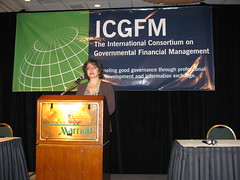
Nadereh Chamlou of the World Bank discussed the talent crisis and the need for gender diversity to support economic growth. She started her presentation with surveys about the workforce in participant countries.
79% of the ICGFM attendees believe that there is a link between female participation in the workforce and an increase in GDP. The most binding constraint on development in countries survey found:
- Financial 56%
- Natural resources 12%
- human resources 43%
Ms. Chamlou believes that the world is at the dawn of a new talent crisis. Demographic changes means that the talent pool is being reduced while countries attempt to develop. This is a problem for all governments and businesses. She pointed out that forecasts suggest that the global population of 60+ is projected to exceed the under15 cohort for first time in history. She warns that developed economies will not find enough employees in home markets to sustain profitability and growth. There is also a brain drain from developing to developed countries. She discussed the "brain waste" defined as women and minorities being underutilized in the work place.
Numerous studies were quoted by Ms. Chamlou that ties GDP growth with gender equality.
- Gender is Smart Economics (The World Bank, 2009)
- The Bottom Line: Connecting Corporate Performance and Gender Diversity (Catalyst, 2004)
- Stimulating Economies through Fostering Talent Mobility (World Economic Forum, 2009)
- The Gender Corporate Gap report (World Economic Forum, 2009)
Ms. Chamlou provided additional statistics on the persistent gender gap. She pointed out that the gender gap is a persistent problem in developed and developing countries. She presented studies from the Middle East and North Africa region. Many of these studies overturned some myths about gender inequality.
Ms. Chamlou concludes that Human Capital is the most indispensable driver of economic growth and the foundation of innovation. Bridging the gender gap at all levels is critical for talent management according to Ms. Chamlou. She warns that the talent gap may be much wider than many think.
Nadereh Chamlou is Senior Advisor to the Chief Economist for the Middle East and North Africa Region of the World Bank. In her 28 years with the World Bank, she has worked in technical and managerial positions across the organization in such areas as economic management, private and financial sector development, infrastructure and environment, corporate governance and the knowledge economy. Her experience also extends to Latin America, East Asia and Pacific, and Eastern Europe. She co-authored a World Bank flagship report, "Corporate Governance: A Framework for Implementation," in 1999, and was co-founder of the World Bank/OECD-sponsored Global Corporate Governance Forum, which she headed from 1998 to 2000. She was the principal author of "Gender and Development in the Middle East and North Africa Region–Women in the Public Sphere" in 2003, and of "The Environment for Women's Entrepreneurship in the Middle East and North Africa Region" in 2008.
Nadereh chamlou crisis de talentos y brecha de género espanol
View more presentations from icgfmconference.
Nadereh chamlou le déficit de talents et l’écart entre les sexes francais
View more presentations from icgfmconference.





1 comment:
Very interesting this post
Hope this can be usefull for the for professional development and information exchange. I think it can really work
Post a Comment